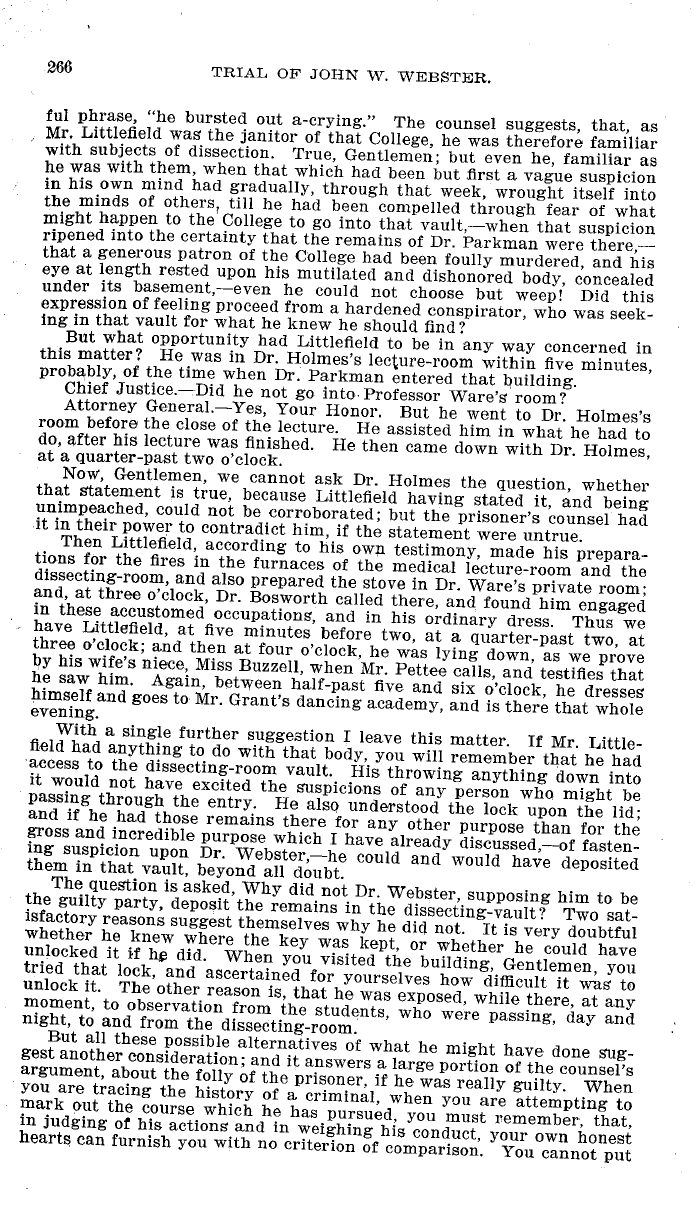|
266 TRIAL OF JOHN W. WEBSTER.
ful phrase "he bursted out a-crying." The counsel suggests, that, as
Mr. Littlefield was the janitor of that College, he was therefore familiar
with subjects of dissection. True Gentlemen; but even he, familiar as
he was with them when that which had been but first a vague suspicion
in his own mind had gradually, through that week, wrought itself into
the minds of othersi till he had been compelled through fear of what
might happen to the College to go into that vault,-when that suspicion
ripened into the certainty that the remains of Dr. Parkman were there,-
that a generous patron of the College had been foully murdered, and his
eye at length rested upon his mutilated and dishonored body, concealed
under its basement,-even he could not choose but weep! Did this
expression of feeling proceed from a hardened conspirator, who was seek-
ing in that vault for what he knew he should find?
But what opportunity had Littlefield to be in any way concerned in
this matter? He was in Dr. Holmes's lecture-room within five minutes,
probably, of the time when Dr. Parkman entered that building.
Chief Justice.-Did he not go into Professor Ware's room?
Attorney General.-Yes, Your Honor. But he went to Dr. Holmes's
room before the close of the lecture. He assisted him in what he had to
do, after his lecture was finished. He then came down with Dr. Holmes,
at a quarter-past two o'clock.
Now, Gentlemen, we cannot ask Dr. Holmes the question, whether
that statement is true because Littlefield having stated it, and being
unimpeached, could not be corroborated; but the prisoner's counsel had
it in their power to contradict him if the statement were untrue.
Then Littlefield, according to his own testimony, made his prepara-
tions for the fires in the furnaces of the medical lecture-room and the
dissecting-room, and also prepared the stove in Dr. Ware's private room;
and, at three o'clock, Dr. Bosworth called there, and found him engaged
in these accustomed occupations, and in his ordinary dress. Thus we
have Littlefield, at five minutes before two, at a quarter-past two, at
three o'clock; and then at four o'clock, he was lying down, as we prove
by his wife's niece, Miss Buzzell when Mr. Pettee calls, and testifies that
he saw him. Again between half-past five and six o'clock, he dresses
himself and goes to Mr. Grant's dancing academy, and is there that whole
evening.
With a single further suggestion I leave this matter. If Mr. Little-
field had anything to do with that body, you will remember that he had
access to the dissecting-room vault. His throwing anything down into
it would not have excited the suspicions of any person who might be
passing through the entry. He also understood the lock upon the lid;
and if he had those remains there for any other purpose than for the
gross and incredible purpose which .I have already discussed,-of fasten-
ing suspicion upon Dr. Webster,-he could and would have deposited
them in that vault, beyond all doubt.
The question is asked, Why did not Dr. Webster, supposing him to be
the guilty party, deposit the remains in the dissecting-vault? Two sat-
isfactory reasons suggest themselves why he did not. It is very doubtful
whether he knew where the key was kept, or whether he could have
unlocked it if hp did. When you visited the building, Gentlemen, you
tried that lock, and ascertained for yourselves how difficult it was to
unlock it. The other reason is, that he was exposed, while there, at any
moment, to observation from he students, who were passing, day and
night, to and from the dissecting-room.
But all these possible alternatives of what he might have done sug-
gest another consideration; and it answers a large portion of the counsel's
argument, about the folly of the prisoner, if he was really guilty. When
you are tracing the history of a criminal, when you are attempting to
mark out the course which he has pursued, you must remember, that,
in judging of his actions and in weighing his conduct, your own honest
hearts can furnish you with no criterion of comparison. You cannot put
|

